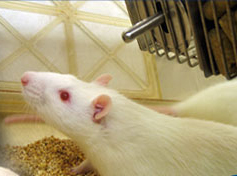Knockout rat
Knockout rat refers to a genetically modified organism (GMO) rat in which one or more genes have been turned off, or "knocked out," through a process known as gene knockout. This genetic manipulation is used for scientific research to study the role of specific genes in health and disease. The knockout rat is a valuable model for understanding genetic diseases, physiology, and drug development, providing insights that can be relevant to human conditions.
Overview
The concept of a knockout rat involves the targeted disruption or modification of specific genes within the rat's DNA. This is achieved through various genetic engineering techniques, such as CRISPR-Cas9, which allows for precise editing of the genome. By knocking out a gene, researchers can observe the effects of its absence on the organism's development, behavior, and physiology, offering clues about the gene's function.
Applications
Knockout rats are used in a wide range of biomedical research areas. They are particularly valuable in studies related to genetic disorders, as they can mimic human diseases that are linked to specific genetic mutations. This makes them essential tools for understanding the pathophysiology of diseases, identifying potential biomarkers, and evaluating the efficacy and safety of new pharmaceuticals.
In addition to disease modeling, knockout rats are used in the study of gene function and gene regulation, as well as in research on complex traits such as behavior, aging, and metabolism. Their similarity to humans in physiological and genetic aspects makes them more relevant models than mice for certain types of research.
Techniques
Creating a knockout rat involves several steps, starting with the selection of the target gene to be knocked out. The most common method for gene knockout in rats has been the use of embryonic stem cells (ES cells) that are genetically modified in vitro and then introduced into rat embryos. However, the development of CRISPR-Cas9 gene-editing technology has revolutionized this process, offering a more efficient and precise means of creating knockout rats.
Ethical Considerations
The use of knockout rats, like other genetically modified animals in research, raises ethical questions regarding animal welfare and the potential long-term impacts on ecosystems should these organisms escape into the wild. Ethical guidelines and regulatory frameworks are in place to ensure that the use of knockout rats in research is justified, humane, and conducted with the utmost care to minimize suffering.
Conclusion
Knockout rats have become indispensable tools in biomedical research, offering valuable insights into the genetic basis of diseases and the potential effects of therapeutic interventions. As genetic engineering technologies continue to evolve, the creation and use of knockout rats are expected to expand, further enhancing our understanding of genetics and improving the development of treatments for human diseases.
Transform your life with W8MD's budget GLP-1 injections from $125.
W8MD offers a medical weight loss program to lose weight in Philadelphia. Our physician-supervised medical weight loss provides:
- Most insurances accepted or discounted self-pay rates. We will obtain insurance prior authorizations if needed.
- Generic GLP1 weight loss injections from $125 for the starting dose.
- Also offer prescription weight loss medications including Phentermine, Qsymia, Diethylpropion, Contrave etc.
NYC weight loss doctor appointments
Start your NYC weight loss journey today at our NYC medical weight loss and Philadelphia medical weight loss clinics.
- Call 718-946-5500 to lose weight in NYC or for medical weight loss in Philadelphia 215-676-2334.
- Tags:NYC medical weight loss, Philadelphia lose weight Zepbound NYC, Budget GLP1 weight loss injections, Wegovy Philadelphia, Wegovy NYC, Philadelphia medical weight loss, Brookly weight loss and Wegovy NYC
|
WikiMD's Wellness Encyclopedia |
| Let Food Be Thy Medicine Medicine Thy Food - Hippocrates |
Medical Disclaimer: WikiMD is not a substitute for professional medical advice. The information on WikiMD is provided as an information resource only, may be incorrect, outdated or misleading, and is not to be used or relied on for any diagnostic or treatment purposes. Please consult your health care provider before making any healthcare decisions or for guidance about a specific medical condition. WikiMD expressly disclaims responsibility, and shall have no liability, for any damages, loss, injury, or liability whatsoever suffered as a result of your reliance on the information contained in this site. By visiting this site you agree to the foregoing terms and conditions, which may from time to time be changed or supplemented by WikiMD. If you do not agree to the foregoing terms and conditions, you should not enter or use this site. See full disclaimer.
Credits:Most images are courtesy of Wikimedia commons, and templates, categories Wikipedia, licensed under CC BY SA or similar.
Contributors: Prab R. Tumpati, MD




